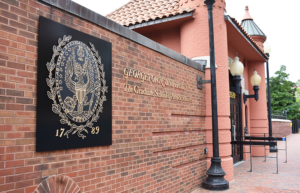
Georgetown University’s graduate school plans to offer teaching licensure for the first time starting 2018.
Georgetown University plans to offer teaching licensure in 2018 for the first time after the graduate program in educational transformation received accreditation for its teaching certification programs Oct. 17.
The master of arts in educational transformation currently offers two concentrations: advocacy and policy, and learning and teaching. Accredited by the Office of the State Superintendent of Education of Washington, D.C., the learning and teaching concentration is now accepting applications for its first cohort to begin study in July 2018. The program offers certifications in secondary science and in English as a second language.
After a nearly yearlong accreditation process that began last January, Sabrina Wesley-Nero (SFS ’95), head of teacher preparation for the educational transformation program, looks forward to starting with the first learning and teaching cohort this summer.
“They’re a direct response to the needs of our community,” Wesley-Nero said about the choice of certifications.
From the 2008-2009 to the 2016-2017 academic year, D.C. reported teacher shortages in science and English as a second language, according to a 2017 Department of Education report.
The educational transformation program, launched last summer with the advocacy and policy concentration, is an interdisciplinary program that plans to eventually offer four concentrations: advocacy and policy, learning and teaching, educational design and technology and leadership and innovation.
With professors from a variety of disciplines, including biology, public policy and linguistics, among others, the program’s faculty reflect the “interdisciplinary curriculum” of the program, according to the program’s website.
While the program is interdisciplinary, its beginnings tried to build upon Georgetown’s strengths. Advocacy and policy, which launched its first class last summer, built upon Georgetown’s existing strengths in policy, according to Douglas Reed, director of the educational transformation program.
“Since we already have expertise in policy, it made sense to sort of reach out to students who want to do educational policy,” Reed said. “Learning and teaching is a bigger innovation for the university.”
Learning and teaching is at the core of the program, according to Reed, who emphasized the importance of instruction.
“One of the things we’re really, really trying to pay close attention to is to ensure that everyone who goes into advocacy and policy has a really clear understanding of what effective instruction looks like,” Reed said.
Educational advocacy and leadership is a key goal for Wesley-Nero as well.
“We’re really hoping to develop teachers who are educational leaders both inside and outside the classroom,” Wesley-Nero said.
Although advocacy and policy is a one-year program, learning and teaching will be a two-year program. The teaching certification courses, which students take in their second year in the program, extend the concentration.
All concentrations have a residency component, and learning and teaching students will be placed in D.C. public or charter schools as teaching aides. This hands-on learning is part of what makes the program special, according to Wesley-Nero.
“Our commitment to equity and social justice and commitment to experiential learning … makes it uniquely Georgetown,” Wesley-Nero said.
According the Cawley Career Center’s First Destination Report, which surveys recent graduates, 6 percent of the class of 2016 went on to pursue careers in education. Education tied with government and health care was the industry with the fifth-highest number of graduates.
Georgetown offers an undergraduate minor in education, inquiry and justice, volunteer programs in D.C. schools through the Center for Social Justice and a master of arts in learning and design, which focuses on higher education.
For undergraduates who want to “continue within the educational field but don’t quite know how to access that,” Reed said having a graduate program with teaching certifications at Georgetown can bridge the divide.
“This can become a really fruitful way for them to take the next step in education,” Reed said.




















